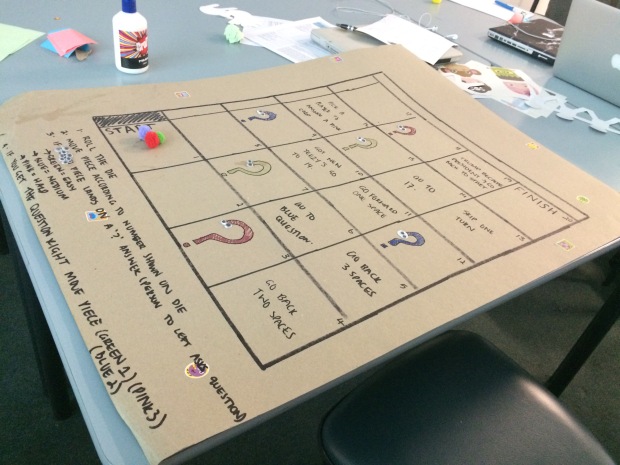In this week’s tutorial, we learned about…
Well, learning.
Learning can be fun. And it should be. That’s right. Gaming is not only a fun way to learn, but it is amongst the most effective methods for doing just that. Below is an image of the glamorous game board we created from ordinary classroom materials. Look out Monopoly and Chess, soon everyone will have to to make room for one of these in their cabinets.

It’s simple, really. Roll the dice and get ready for the pop culture ride of a lifetime. How much do you know? A competitive yet lighthearted way to learn about popular culture, this game flourishes where a book falls short. The question cards are waiting, but only you can determine your fate.
According to EDUCAUSE Games and Learning Constituent Group’s article, “7 Things You Should Know About Games and Learning,” effective education occurs when “the learning and skill development of the game mechanics aligns with desired learning outcomes.” In our game, the “desired learning outcome” is to gain knowledge about the field of popular culture. As gamemakers, we would focus much of our efforts in producing quality question cards — if anything is worth the time, it’s this. This part is crucial to the learning experience. With the right cards, consumers will want to play the game, and most of all, want to learn.

Next, we would use failure to our advantage. That same article discusses how “failure is neither a setback nor an outcome but rather an indication that more work is needed to master the skill or knowledge at hand.” In other words, failure will push players toward success. It is essential to create a strong incentive to keep fighting even during a losing battle. To keep learning.
In his YouTube video “Learning With Video Games,” James Paul Gee analyzes Barsalou’s still-valid claim from 1999 that “comprehension is grounded in perceptual simulations that prepare agents for situated action.” As Gee explains it, “When human beings understand anything, whether it’s a text or the world, they understand it not by abstract generalities, but by literally being able to run in their head a simulation of images and actions and experiences that the words refer to.” Games are the future of learning.
Gee brings up an interesting point in his argument. If you give two kids the same book, contrary to what one may believe, they do not have the same opportunity to learn. He justifies his stance by explaining that if one kid had the chance to experience the material in the book rather than read it, he or she would obtain a huge advantage, and ultimately learn more.
Gee then turns his argument to the realm of video games, emphasizing that one cannot properly learn a video game from reading the directions in the box. The only way to learn a video game is to play it. He asserts,”We have handed kids manuals without the games.” Books alone are not sufficient in the motivation to learn. Experience makes all the difference.
It’s time to hand them the games.
References